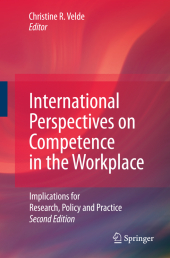 Neuerscheinungen 2014Stand: 2020-02-01 |
Schnellsuche
ISBN/Stichwort/Autor
|
Herderstraße 10
10625 Berlin
Tel.: 030 315 714 16
Fax 030 315 714 14
info@buchspektrum.de |

Christine R. Velde
International Perspectives on Competence in the Workplace
Implications for Research, Policy and Practice
Herausgegeben von Velde, Christine R.
2. Aufl. 2014. xvii, 244 S. 10 Tabellen. 235 mm
Verlag/Jahr: SPRINGER NETHERLANDS; SPRINGER 2014
ISBN: 9400790546 (9400790546)
Neue ISBN: 978-9400790544 (9789400790544)
Preis und Lieferzeit: Bitte klicken
As the world´s economy develops, the future will require a more competent workforce. In this revised second edition of Christine Velde´s book, a variety of researchers from around the world provide a truly international perspective on this issue.
As the world´s economy develops into a more dynamic, fast-moving, and unpredictable entity, it is crucial that the workers who create wealth have the ability to assess and respond to new and unforeseen challenges. In other words, the future will require a more competent workforce. What, though, does this mean in practice? In this, the fully revised second edition of Christine Velde´s book, a variety of researchers from around the world provide a truly international perspective on the issue. They help to redefine the term competence. Rather than responding to challenges using a pre-existing set of skills, they see competence as having the ability to assess new situations, and then adapt one´s response accordingly, particularly in collaboration with others.
Providing the reader with insightful perspectives about competence in different situations and contexts, the book´s sections explore the concept of competence in industry and vocational education, in schools and colleges, in small businesses and companies, and in universities. The interpretation, experience and teaching of competence in the workplace is boiled down to five essential components that in themselves represent an argument for a more holistic conception of competence. Velde herself concludes the book by synthesizing and reflecting on the contents.
This book provides the reader with insightful perspectives on competence, and the characteristics of learning environments in different workplace contexts. Drawing on phenomenographic insights allows it to present a more enlightened view of competence, at the same time as opening up an international dialogue about the meaning and interpretation of competence in the workplace. Useful not only to educators and researchers, this volume will also assist leaders and managers in a variety of contexts to develop more meaningful workplaces.
FOREWORD, Ference Marton. NOTES ON THE CONTRIBUTORS. INTRODUCTION. Perspectives on Competence Development: Views and Tensions, Christine Velde. Theme One. Competence in the Workplace: A Focus on Industry and Vocational Education. 1. Understanding the Basis for Competence Development, Jorgen Sandberg. 2. Exploring Opportunities for Collaborative Linkages in the VET Sector: A Comparative Study of VET in Australia and Japan, Christine Velde. 3. Work, Change and Competence, Stephen Billett. Theme Two. Competence in the Workplace: A Focus on Schools and Colleges. 4. The Changing Context of Business Education: Competency Requirements for the New Paradigm, Christina Yu and Christine Velde. 5. Professional Competencies: Challenges for the Tertiary Sector, Shirley Yates. 6. Employers´ Perspectives of Graduate Outcomes: A Case Study of a Private College in Shanghai, Christine Velde. Theme Three. Competence in the Workplace: A Focus on Small Business and Companies. 7. Workplace Trainers in Enterprises: Merging and Emerging Areas of Practice, Roger Harris and Michele Simons. 8. Developing Entrepreneurial Competencies through Dilemna-Reconciliation, Pi-Shen Seet and Nor Hazlina Ahmad. 9. Learning Environments of Employees in Knowledge Intensive Company Units, Lennart Svensson. heme Four. Competence in the Workplace: A Focus on University and Global Contexts. 10. Intercultural Knowledge Management: A Competency Model for the Repatriation of Expatriates in the Asia-Pacific, Christine Velde. 11. Local Needs, Global Contexts: Innovation and Excellence in Teaching in theModern University. Penny Boumelha. 12. Demands for Intercultural Communicative Competence in Working- Life: Some Experiences of Swedish Higher Education Co-operation with Baltic Neighbour, Estonia, Eva Ericsson. CONCLUSION. Competence in the Workplace: A Synthesis of Issues for Reflection and Action, Christine Velde. Index.


